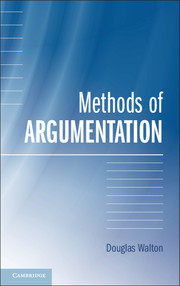Book contents
- Frontmatter
- Contents
- Acknowledgments
- 1 Introducing Some Basic Concepts and Tools
- 2 Argument Attack, Rebuttal, Refutation and Defeat
- 3 Arguments with Missing Parts
- 4 Applying Argumentation Schemes
- 5 Similarity, Precedent and Argument from Analogy
- 6 Teleological Argumentation to and from Motives
- 7 The Carneades Model of Scientific Discovery and Inquiry
- 8 Fallacies, Heuristics and Sophistical Tactics
- 9 The Straw Man Fallacy
- Bibliography
- Index
3 - Arguments with Missing Parts
Published online by Cambridge University Press: 05 June 2014
- Frontmatter
- Contents
- Acknowledgments
- 1 Introducing Some Basic Concepts and Tools
- 2 Argument Attack, Rebuttal, Refutation and Defeat
- 3 Arguments with Missing Parts
- 4 Applying Argumentation Schemes
- 5 Similarity, Precedent and Argument from Analogy
- 6 Teleological Argumentation to and from Motives
- 7 The Carneades Model of Scientific Discovery and Inquiry
- 8 Fallacies, Heuristics and Sophistical Tactics
- 9 The Straw Man Fallacy
- Bibliography
- Index
Summary
This chapter is about how to analyze kinds of arguments traditionally called enthymemes, arguments that require for proper analysis and evaluation the identification of a missing premise, or in some instances a missing conclusion. A small section on enthymemes has traditionally been included in logic textbooks from the time of Aristotle. In this chapter it is shown how methods of argumentation study, including software tools recently developed in computing, have enabled new ways of analyzing such arguments. It is shown how the employment of these methods to four key examples reveals that the traditional doctrine of the enthymeme needs to be radically reconfigured in order to provide a more useful approach to the analysis of incomplete arguments.
There is an extensive literature on incomplete arguments, and this chapter begins with a survey of enough of this literature to make it possible to understand the investigation that follows and to show why it is needed. The second section of the chapter gives a brief historical outline of the literature on enthymemes, beginning with Aristotle’s account of it, including coverage of a significant historical controversy about what Aristotle meant by this term. One of the problems with the task of analyzing incomplete arguments is to get some general grasp of what it is one is trying to do, because the solution to this task can be applied not only to logic but to many other fields that contain argumentation, such as science and law. Therefore, it is important to formulate at the beginning what the purpose of the investigation is supposed to be. A brief account of this is contained in Section 3. The next four sections contain extensive analyses of four examples of incomplete arguments. The first example is meant to be very simple, but the next three examples show some highly significant factors found in carrying out the task of argument analysis needed to identify the missing parts of an argument. These findings are taken into account in Section 9 of the chapter, where both the nature of the task and the proper terminology needed to assist it are reformulated and clarified.
- Type
- Chapter
- Information
- Methods of Argumentation , pp. 63 - 92Publisher: Cambridge University PressPrint publication year: 2013



